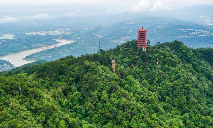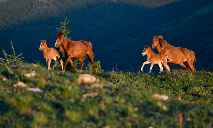Barren land by Yarlung Zangbo River sees sea of green trees in SW China's Tibet (8)
Penjig checks the growth of saplings at the afforestation area by the Yarlung Zangbo River in Zhanang County, Shannan City of southwest China's Tibet Autonomous Region, May 26, 2022.
The middle reaches of the Yarlung Zangbo River, once stretches of barren land with sandstorms raging in spring and winter, now see a sea of green trees all over the place.
With unwavering endeavors of sand control and ecology restoration, more than 45 million trees have been planted over the past four decades in Shannan, an area the Yarlung Zangbo River runs through.
In 1967, Li Chunlu, an agricultural school graduate from northwest China's Gansu Province, was assigned to work in Shannan. On his way to work, the 24-year-old was inundated by the yellow dust in the air. Li thought, at the time, how good it would be if trees could be planted here.
An ambition of planting trees was bred in Li Chunlu as a boy named Penjig from a village by the Yarlung Zangbo River planted a few willow branches on the hillside where he grazed his sheep. The willow branches survived and then grew into willow trees.
In 1982, Li Chunlu shifted his work to the forestry section of the local agriculture and animal husbandry bureau. He tried to start planting trees along the river. However, it was too difficult for the trees to survive due to the drought in spring and winter and the flood during summer and autumn.
In 1984, Li Chunlu and his colleagues finally worked out tree-planting techniques along the riverside, which led to their success of growing about 800 mu (53.3 hectares) of experimental forest.
In the 1990s, the afforestation project was further expanded. Li Chunlu, who was responsible for the forestation work, selected Penjig, who had already grown up as an adult, as one of the team leaders to oversee a tree-planting project because of his relevant experience. Together with 12 villagers, the team was jointly engaged in the restoration project along the river.
Local villagers joined the forestation work as their side business to increase their income at first. Later, they were a lot more motivated to grow trees as they witnessed less sand and agricultural disasters thanks to the afforestation effort. Crop yield has thus been boosted, while pasture has been gradually expanded with more cattle and sheep raised.
In 2004, with the support of the local government, Penjig, who had more than 10 years of experience in tree planting, built his own nursery.
Today, more and more people are taking part in this campaign, and the riverside of the middle reaches of Yarlung ZangBo River has been lush and green. (Xinhua/Sun Fei)
 |  |
Photos
Related Stories
- Stunning view of Yamzho Yumco lake - one of the three sacred lakes in Tibet
- Tibet still among world's best regions in environment: report
- Caterpillar fungus harvested in China's Tibet
- Feature: Rural projectionist heralds cinematic joy for Tibetan villagers
- Life in Tibet: Teaching seniors to use smartphones
Copyright © 2022 People's Daily Online. All Rights Reserved.










